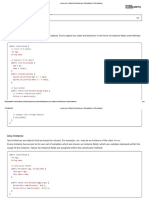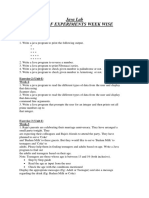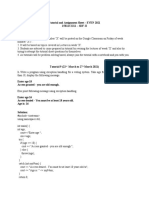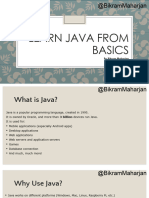2018 IPT Lab Manual
2018 IPT Lab Manual
Uploaded by
sajjanokumarCopyright:
Available Formats
2018 IPT Lab Manual
2018 IPT Lab Manual
Uploaded by
sajjanokumarOriginal Title
Copyright
Available Formats
Share this document
Did you find this document useful?
Is this content inappropriate?
Copyright:
Available Formats
2018 IPT Lab Manual
2018 IPT Lab Manual
Uploaded by
sajjanokumarCopyright:
Available Formats
DEPARTMENT OF INFORMATION TECHNOLOGY
FACULTY OF ENGINEERING & TECHNOLOGY
SUBJECT TITLE: INTEGRATIVE PROGRAMMING
&TECHNOLOGY LAB
SUBJECT CODE: IT1022
Name:
Register Number:
Department of Information Technology
SRM INSTITUE OF SCIENCE AND TECHNOLOGY, SRM Nagar,
Kattankulathur-603203
Kancheepuram District, Tamil Nadu
15IT411J –Integrative Programming and Technology Laboratory
Department of Information Technology, SRMIST Page |2
15IT411J –Integrative Programming and Technology Laboratory
TABLE OF CONTENT
Date Ex.No Name of the Experiment Mark Signature
I:JAVA NATIVE INTERFACE-JNI
1 a. Object Passing
1 b. Sorting Array
1 c. Different Data Types and Exception handling
II:JAVA BEANS
2 a. Account Details –Using Non-Visual Bean
2 b. Color Bean – Using Visual Bean
III: ENTERPRISE JAVA BEAN
3 a. Stateful Session Bean for Bank Application
3 b. Stateless session Bean for Shopping Cart
IV.JMS
4 a. Developing JMS Application
V.JYTHON
5 a. Simple Swing application in Java using Jython
VI. DJANGO
6 a. Web application with Django using Jython
Department of Information Technology, SRMIST Page |3
15IT411J –Integrative Programming and Technology Laboratory
SYLLABUS
PURPOSE
This course enables the students to practice and implement various concepts like RMI, JAVA
BEANS, and Web services using EJB.
INSTRUCTIONAL OBJECTIVES
After successful completion of the course, the students should be able to
• Implement distributed application using RMI.
• Implement distributed components such as Java bean, EJB
• Implement Language interoperability program using JNI
LIST OF EXERCISES
JNI
Object passing
Array sorting
Exception handling
JAVA BEAN
Create a simple bean components using java class and swing class
ENTERPRISE JAVA BEAN
Create a session, message driven and entity component
Create a web services
Create a design pattern
JMS
Developing JMS Application
JYTHON
Simple Swing application in Java using Jython
DJANGO
Web application with Django using Jython
REFERENCE:
1. Integrative Programming and Technologies Lab Manual, Department of Information
Technology, SRMIST.
TOTAL 60
Department of Information Technology, SRMIST Page |4
15IT411J –Integrative Programming and Technology Laboratory
Rubrics
Experiment Max.
Grading Rubrics
Component Marks
Program is well Missing two or more
documented. The required comments .The
Documentatio documentation is well documentation is simply
n/ 2 written and clearly embedded comments
Procedure explains what the code and does not help the
is accomplishing and reader understand the
how(2 marks) code(1 mark)
Completeness Completeness
of code, of code,
consistent consistent Completeness of
variable variable code, consistent
naming and naming and variable naming
formatting, formatting, and formatting,
well well well commented,
commented, commented, uses existing
Program 3
uses existing uses existing skills in new
skills in new skills in new ways/learns new
ways/learns ways/learns skills to solve the
new skills to new skills to experimental
solve the solve the problem. (1
experimental experimental mark)
problem. (3 problem. (2
marks) marks)
Program is free
Program is of errors and Program
free of errors output is not contains few
and output is properly logical errors
well formatted. formatted. and output is not
Demonstrates Demonstrates formatted.
Program Excellent a clear Demonstrates
3
Execution problem understanding partial
solving and of the understanding of
creativity concepts the concepts
skills. relevant to the relevant to the
(3 marks) experiment. experiment.
(2 marks) (1 mark)
Program 2 Decision control logic, Decision control logic,
Testing loop logic in program loop logic in program
exhibits proper exhibits proper functional
functional behavior and behavior and Output is
Department of Information Technology, SRMIST Page |5
15IT411J –Integrative Programming and Technology Laboratory
Output is obtained for
obtained for varying sets
varying sets of input
of input data. (1 mark)
data. (2 marks)
JNI
Department of Information Technology, SRMIST Page |6
15IT411J –Integrative Programming and Technology Laboratory
Exercise 1A JNI - Object Passing
Date:
Question:Create a JNI program to pass object as argument from java to c program.
Aim:
Procedure:
1) Create a Java Application named as “Exercise2_JNI” with a java main class named as
“PassingObject” and a java class named as “SimpleClass”
2) In the “SimpleClass” file do the following
a. Declare a variable int count;
b. Define a method named “Increment()” to increment the count value by 10 as
count=count*10; and print the count value inside the method.
3) In the “PassingObject” class/file do the following
a. Define a native method declaration as follows
public static native void changecountvalue ( SimpleClass sc); and inside the main()
method perform the following
1. Create the obj for SimpleClass as sc,
2. assign the value of count to 10,
3. invoke the Increment() method,
4. invoke changecountvalue by passing ‘sc’ as argument ,
5. print the value of count before and after changecountvalue() method call.
4) Create a C/C++ application project named as “Excercise2_JNI_C” with “PassingObject.c”
file in it.
Create headerfile & perform the necessary step to change the value of count from c program.
Program:
Department of Information Technology, SRMIST Page |7
15IT411J –Integrative Programming and Technology Laboratory
Department of Information Technology, SRMIST Page |8
15IT411J –Integrative Programming and Technology Laboratory
Department of Information Technology, SRMIST Page |9
15IT411J –Integrative Programming and Technology Laboratory
Sl No: Assessment Process Description Mark(s)
1 Documentation/Procedure(2)
2 Program(3)
3 Program Execution(3)
4 Program Testing(2)
Total(10)
Remarks
Date of Completion: Signature
Result:
Exercise 1B JNI –Sorting Array
Department of Information Technology, SRMIST P a g e | 10
15IT411J –Integrative Programming and Technology Laboratory
Date:
Question:Create a JNI program to sort the values in an array by using C++ application.
Aim:
Procedure:
1. Create a java main class named as “Sorting_array” which contain only one native method as
follows
public native int[] ArraySorting (int[] array);
and a static array declaration as
Static int array[];
within the main() method perform the following.
a. get the length of the array
b. now using length create a new array
c. from user get the values for the array
d. call the method ArraySorting (int []) by passing the array values got from the user.
e. assign the return value of ArraySorting() method to a new array variable called as
sorted_array[] and print the sorted_array[] values.
2. create a c/c++ application with “Sorting_Array.c” file
create headerfile & perform the necessary step to sort the values either in ascending or
descending order using C++ and return the sorted array to the jave code.
Program:
Department of Information Technology, SRMIST P a g e | 11
15IT411J –Integrative Programming and Technology Laboratory
Department of Information Technology, SRMIST P a g e | 12
15IT411J –Integrative Programming and Technology Laboratory
Department of Information Technology, SRMIST P a g e | 13
15IT411J –Integrative Programming and Technology Laboratory
Sl No: Assessment Process Description Mark(s)
1 Documentation/Procedure(2)
2 Program(3)
3 Program Execution(3)
4 Program Testing(2)
Total(10)
Remarks
Date of Completion: Signature
Result:
Department of Information Technology, SRMIST P a g e | 14
15IT411J –Integrative Programming and Technology Laboratory
Exercise 1C JNI – Different Data Types and Exception handling
Date:
Question:Create a JNI program to use different types such as int, float, String & Exception
Handling with c program.
Aim:
Procedure:
1. create a java main class called as “Exception_Difftypes”
Define the following method(s) declaration
a. public native int intMethod (int n);
b. public native Boolean booleanMethod (boolean text)
c. public native string stringMethod (String text);
d. public native void doit() throws IllegalArgumentException;
and the following method definition
e. public void callback () throws NullPointerException
{
throw new NullPointerException(“CatchThrow.callback”)
}
Inside the main () function perform the following
Create the object of the class and invoke the method a, b, c and print the values returned
by them.
In try… catch block call the d & e method.
2. Create a C/C++ application with “Exception_Differenttype.c” file
Create headerfile & perform the following operation in different method.
a. intMethod () return the product of 2 No’s
b. booleanMethod () return the !boolean value
c. StringMethod () return the uppercase string
d. doit () to throw the exception
Program:
Department of Information Technology, SRMIST P a g e | 15
15IT411J –Integrative Programming and Technology Laboratory
Department of Information Technology, SRMIST P a g e | 16
15IT411J –Integrative Programming and Technology Laboratory
Department of Information Technology, SRMIST P a g e | 17
15IT411J –Integrative Programming and Technology Laboratory
Sl No: Assessment Process Description Mark(s)
1 Documentation/Procedure(2)
2 Program(3)
3 Program Execution(3)
4 Program Testing(2)
Total(10)
Remarks
Date of Completion: Signature
Result:
Department of Information Technology, SRMIST P a g e | 18
15IT411J –Integrative Programming and Technology Laboratory
MSMQ Using VB
Department of Information Technology, SRMIST P a g e | 19
15IT411J –Integrative Programming and Technology Laboratory
Exercise 2A Passing message using MSMQ
Date:
Question: Create a application using VB for sending message using MSMQ concept
Aim:
Procedure:
Create a STDEXE VB application named as “QWriter” with the following form design and write
the necessary code to update the message in the MSMQ object
Text box 1 named as txtlabel and text box 2 named as txtbody and command button named as
cmdsend
Create a STDEXE VB application named as “QReader” with the following form design and
write the necessary code to retrieve the message from the MSMQ object
Text Box named as txtLog, Button named as cmdDeleteQ, and a timer named as tmrTerminate
Department of Information Technology, SRMIST P a g e | 20
15IT411J –Integrative Programming and Technology Laboratory
Program:
Department of Information Technology, SRMIST P a g e | 21
15IT411J –Integrative Programming and Technology Laboratory
Department of Information Technology, SRMIST P a g e | 22
15IT411J –Integrative Programming and Technology Laboratory
Sl No: Assessment Process Description Mark(s)
1 Documentation/Procedure(2)
2 Program(3)
3 Program Execution(3)
4 Program Testing(2)
Total(10)
Remarks
Date of Completion: Signature
Result:
Department of Information Technology, SRMIST P a g e | 23
15IT411J –Integrative Programming and Technology Laboratory
JAVA BEANS
Department of Information Technology, SRMIST P a g e | 24
15IT411J –Integrative Programming and Technology Laboratory
Exercise 3A Account Details –Using Non-Visual Bean
Date:
Question: Develop a JAVA Bean to calculate the current balance in your account and display
the balance detail as a message using JFrame.
Aim:
Procedure:
1. Create a java bean class named as ‘AccountDetail_Bean’. Define the following
Properties
a. private String Date
b. private long Acct_no
c. private String Name
d. private double Withdraw_amount
e. private final double Balance_amt = 100000
Methods
a. public void generate_SystemDate( )
It gets the system date and from this call setDate( ) method.
b. public double current_balance( )
This method calculates balance as balance = Balance_amt –
withdraw_amount. If balance_amt is less than Withdraw_amount then
return balance_amt itself, otherwise return the balance calculated.
2. Create another project with java swing Form. In this create a JFrame called as
Account_Form. Design the form with following details.
Department of Information Technology, SRMIST P a g e | 25
15IT411J –Integrative Programming and Technology Laboratory
3. On double clicking the “OK” button
a. Set Accountno,name,Withdraw_amount, values of Bean class by the values
entered in the jtextfield Text_AccountNo, Text-Name and Text_withdraw
respectively.
b. Get the balance from the Bean class and set the “Text-balance” jtextfield Box
with it.
c. Calculate the current balance by invoking the method current_balance( ) defined
in Bean class and set the calculated current balance to the label “lbl_Balance”.
4. On double clicking the ‘Message button
5. Display the message as “Balance in your Account no: <acc_no> as on <date> is
<balance_amt>”
6. The message should be displayed using JoptionPane.showMessageDialog(null, output,
“sms”, 1)
Program:
Department of Information Technology, SRMIST P a g e | 26
15IT411J –Integrative Programming and Technology Laboratory
Department of Information Technology, SRMIST P a g e | 27
15IT411J –Integrative Programming and Technology Laboratory
Department of Information Technology, SRMIST P a g e | 28
15IT411J –Integrative Programming and Technology Laboratory
Sl No: Assessment Process Description Mark(s)
1 Documentation/Procedure(2)
2 Program(3)
3 Program Execution(3)
4 Program Testing(2)
Total(10)
Remarks
Date of Completion: Signature
Result:
Department of Information Technology, SRMIST P a g e | 29
15IT411J –Integrative Programming and Technology Laboratory
Exercise 3B Color Bean – Using Visual Bean
Date:
Question: Create a visual java bean using mouse event for moving a small oval along with the
cursor point.
Aim:
Procedure:
1. Design a Java Bean class named as “MouseMove_Bean” extends JPanel class.
with properties :- private int Circle_size=20
private int xm, ym ;
method:- private color randomColor() {……}
> used to generate random colors.
[Hint- use predefined color() class takes 3 int org for color() constructor.Math.random() used
to provide random no.]
Overridden methods ( From JPanel)
a. public void paintComponent (Graphics g)
Set the color by calling random color () method & draw the oval with the “Circlesize”
property defined above
b. public Dimension get( )
Return new Dimension (200, 200) for setting the size of the JPanel
Inside the Constructor
a. Set the background for the JPanel (Bean created) and addMouseMotionListener to
perform Mousemoved event.
b. Inside the MouseMoved () event method get the x, y position of the cursor and set it from
xm & ym variables.
Note :- While drawing the oval use xm, ym, circle-size, so that circle moves when xm, ym
changes when mouse is moved.
2.Design a JApplet Form called as “MouseMove_Form”
Here drag & drop the above bean created.
3.Execute the JApplet.
Program:
Department of Information Technology, SRMIST P a g e | 30
15IT411J –Integrative Programming and Technology Laboratory
Department of Information Technology, SRMIST P a g e | 31
15IT411J –Integrative Programming and Technology Laboratory
Department of Information Technology, SRMIST P a g e | 32
15IT411J –Integrative Programming and Technology Laboratory
Sl No: Assessment Process Description Mark(s)
1 Documentation/Procedure(2)
2 Program(3)
3 Program Execution(3)
4 Program Testing(2)
Total(10)
Remarks
Date of Completion: Signature
Result:
Department of Information Technology, SRMIST P a g e | 33
15IT411J –Integrative Programming and Technology Laboratory
ENTERPRISE JAVA BEAN
Department of Information Technology, SRMIST P a g e | 34
15IT411J –Integrative Programming and Technology Laboratory
Exercise 4A Stateful Session Bean – Banking Application
Date:
Question: Create a stateful session bean for Banking Application.
Aim:
Procedure:
1) Create a Java class Library named as “ Exercise5A_Remote”
2) Create JavaEE Enterprise Application named as “Exercise5A_EntAppln_BankAppln”
3) In Exercise5A_EntAppln_BankAppln-ejb project add a java class file named as
“Bank.java” under “ejbpkg” user defined package
a. Include the following methods inside Bank.java
i. void withDraw(int amount) for reducing the balance
ii. void deposit(int dep_amt)for adding the balance
iii. int balance() to return the balance amount
b. One variable int balance =100000
4) Create JavaEE Enterprise Application Client named as
“Exercise5A_BankAppln_Client” with one java main class named as
“Bank_Client.java” under the auto generated package same as the project name.
a. Inside the Bank_client file under main function do the following operation for
two different customers
i. Use choice, amount as int variables
ii. Get any one choice as follows with a variable int choice.
1To withdraw – call the method withdraw() by passing amount
as parameter to reduce the balance
2To deposit – call the method deposit() by passing amount to
add the amount to the balance
0 To finish the transaction
iii. Repeat the above process for a single customer minimum of 5 times
Program:
Department of Information Technology, SRMIST P a g e | 35
15IT411J –Integrative Programming and Technology Laboratory
Department of Information Technology, SRMIST P a g e | 36
15IT411J –Integrative Programming and Technology Laboratory
Department of Information Technology, SRMIST P a g e | 37
15IT411J –Integrative Programming and Technology Laboratory
Sl No: Assessment Process Description Mark(s)
1 Documentation/Procedure(2)
2 Program(3)
3 Program Execution(3)
4 Program Testing(2)
Total(10)
Remarks
Date of Completion: Signature
Result:
Department of Information Technology, SRMIST P a g e | 38
15IT411J –Integrative Programming and Technology Laboratory
Exercise 4B Stateless Session Bean – Shopping Cart
Date:
Question: Create a stateless session bean for shopping cart application.
Aim:
Procedure:
5) Create a Java class Library named as “ Exercise5B_Remote”
6) Create JavaEE Enterprise Application named as “Exercise5B_EntAppln_ShopCart”
7) In Exercise5B_EntAppln_ShopCart-ejb project add a java class file named as
“Shop.java” under “ejbpkg” user defined package
a. Include the following methods inside Shop.java
i. void addItem(int parameter) for adding item
ii. void removeItem(int buy)for reducing the item count
iii. int stock() to return the item value
b. One variable int item=0;
8) Create JavaEE Enterprise Application Client named as “Exercise5B_Shopcart_Client”
with one java main class named as “Shop_Client.java” under the auto generated package
same as the project name.
a. Inside the Shop_client file under main function do the following operation for
two different customers
i. Use choice, no_items as int variables
ii. Get any one choice as follows with a variable int choice.
1To buy – call the method removeItem() by passing no:of items
(no_items) to buy as parameter
2To Add – call the method addItem() by passing no:of
items(no_items) to add to stock
0 To finish the transaction
iii. Repeat the above process for a single customer minimum of 5 times
Program:
Department of Information Technology, SRMIST P a g e | 39
15IT411J –Integrative Programming and Technology Laboratory
Department of Information Technology, SRMIST P a g e | 40
15IT411J –Integrative Programming and Technology Laboratory
Department of Information Technology, SRMIST P a g e | 41
15IT411J –Integrative Programming and Technology Laboratory
Sl No: Assessment Process Description Mark(s)
1 Documentation/Procedure(2)
2 Program(3)
3 Program Execution(3)
4 Program Testing(2)
Total(10)
Remarks
Date of Completion: Signature
Result:
Department of Information Technology, SRMIST P a g e | 42
You might also like
- Java SBQDocument149 pagesJava SBQSiva Karthick67% (6)
- Task Sheet Python Fortune TellerDocument3 pagesTask Sheet Python Fortune TellerIsaac BNo ratings yet
- Answers Lab 2Document2 pagesAnswers Lab 2Ling MaNo ratings yet
- Learn Java - Object-Oriented Java Cheatsheet - Codecademy PDFDocument8 pagesLearn Java - Object-Oriented Java Cheatsheet - Codecademy PDFabhi yadavNo ratings yet
- Bluej - Google SearchDocument1 pageBluej - Google SearchCreeperPie GamingNo ratings yet
- Java Lab SyllabusDocument11 pagesJava Lab Syllabuspranaybhandare765No ratings yet
- IT7412Document225 pagesIT7412shadowuchiha432No ratings yet
- Objectives: Upon Completion of This Lesson, Students Will Be Able ToDocument7 pagesObjectives: Upon Completion of This Lesson, Students Will Be Able ToMohamad FirzanNo ratings yet
- Dotnet Lab Manual Even 2022Document134 pagesDotnet Lab Manual Even 2022Satyam RoyNo ratings yet
- Ooj Prac 3 - 30Document5 pagesOoj Prac 3 - 30ABCD EFGNo ratings yet
- 3340704Document7 pages3340704sanket shahNo ratings yet
- C# Course Outline 2023Document3 pagesC# Course Outline 2023empathiey960No ratings yet
- Project Title - Seven Wonders of The World: Nada International School Year 2021-2022Document7 pagesProject Title - Seven Wonders of The World: Nada International School Year 2021-2022Gacha Path:3No ratings yet
- ITL202 - Ktu QbankDocument5 pagesITL202 - Ktu QbankManoj KumarNo ratings yet
- BCSL305 Updated Lab Manual-1Document53 pagesBCSL305 Updated Lab Manual-14mt21ic015No ratings yet
- Lab1 of The Power of TheDocument8 pagesLab1 of The Power of TheBenedictBulataoNo ratings yet
- Obe Curriculum For The Course: RGPV (Diploma Wing) BhopalDocument22 pagesObe Curriculum For The Course: RGPV (Diploma Wing) Bhopalकिशोरी जूNo ratings yet
- Java Prog Sem-3Document23 pagesJava Prog Sem-3Nitish JhaNo ratings yet
- Laboratory Task 3 (Q) DFP30243 SESI I 2022 2023Document4 pagesLaboratory Task 3 (Q) DFP30243 SESI I 2022 2023Zakwan Hakimi F1122No ratings yet
- IT 3030 - Programming Applications and Frameworks6Document3 pagesIT 3030 - Programming Applications and Frameworks6jathurshanm3No ratings yet
- Rubrics For Lab Experiments PDFDocument5 pagesRubrics For Lab Experiments PDFchandrujanginNo ratings yet
- Java FileDocument84 pagesJava Filehimani namdeoNo ratings yet
- Ta Assignments: Problem Question From TA1 (q1 and q4)Document38 pagesTa Assignments: Problem Question From TA1 (q1 and q4)Iam anonymousNo ratings yet
- Recruitment SystemDocument19 pagesRecruitment Systemyashwanth reddyNo ratings yet
- Course Syllabus PROGRAM: Bachelor of Science in Information Technology CLASSIFICATION OF SUBJECT: - GEN - ED. - SPECIALIZATION - MAJORDocument6 pagesCourse Syllabus PROGRAM: Bachelor of Science in Information Technology CLASSIFICATION OF SUBJECT: - GEN - ED. - SPECIALIZATION - MAJORAnonymous PcPkRpAKD5No ratings yet
- 6th Sem SyllabusDocument19 pages6th Sem SyllabusshravNo ratings yet
- Introduction To Computer Studies, Grade 10 ICS2O1: Course ProfileDocument3 pagesIntroduction To Computer Studies, Grade 10 ICS2O1: Course ProfileMarumamula Santosh KumarNo ratings yet
- UGCA1938Document3 pagesUGCA1938PUBG BATTLEGROUNDNo ratings yet
- Life 2-Review3-Mid1Document3 pagesLife 2-Review3-Mid1fabas2453No ratings yet
- TLP - PROG1224 - Object Oriented Software Development-1Document10 pagesTLP - PROG1224 - Object Oriented Software Development-1unbeatable masterNo ratings yet
- Advanced Object Oriented ProgrammingDocument13 pagesAdvanced Object Oriented ProgrammingSanjana GohelNo ratings yet
- Instruction OopDocument2 pagesInstruction Oopputeriariessya2612No ratings yet
- Object Oriented Programming With JAVA 4341602Document10 pagesObject Oriented Programming With JAVA 4341602Devam Rameshkumar Rana0% (1)
- Lab 7Document5 pagesLab 7ranahassanirfan2005No ratings yet
- IT7411Document157 pagesIT7411cc76747321No ratings yet
- 2018 Winter Model Answer PaperDocument25 pages2018 Winter Model Answer PaperVarad KhopkarNo ratings yet
- لقطة شاشة ٢٠٢٤-٠٥-٠٦ في ١٠.٠٧.١١ صDocument60 pagesلقطة شاشة ٢٠٢٤-٠٥-٠٦ في ١٠.٠٧.١١ صz.abood2075No ratings yet
- JAVA PROGRAMMING LAB MANNUALDocument34 pagesJAVA PROGRAMMING LAB MANNUALArchana PhotocopyNo ratings yet
- JAVA Lesson Plan 19 20Document9 pagesJAVA Lesson Plan 19 20csegunjan03No ratings yet
- 4th Sem Syllabus-49-53Document5 pages4th Sem Syllabus-49-53ninithaNo ratings yet
- Java Lab ManualDocument58 pagesJava Lab ManualViswaprem CANo ratings yet
- 1120231-CO - OOPS All MSBTE Board Paper With SolutionDocument72 pages1120231-CO - OOPS All MSBTE Board Paper With Solutionhackermh862No ratings yet
- 2018 Winter Model Answer PaperDocument32 pages2018 Winter Model Answer Papersaurabhchattar4298No ratings yet
- 15It304J - Web Programming Lab: Name: Register No.: Class: Iii B.Tech. ItDocument34 pages15It304J - Web Programming Lab: Name: Register No.: Class: Iii B.Tech. ItVidushi Sood0% (1)
- Pangasinan State University Urdaneta Campus College of Engineering and ArchitectureDocument2 pagesPangasinan State University Urdaneta Campus College of Engineering and ArchitectureAngelica May BangayanNo ratings yet
- Lab 8 - Lab Assignment 4Document3 pagesLab 8 - Lab Assignment 4NUR SYAFIQAH BINTI BAIDROL AZMEE / UPMNo ratings yet
- LAB#03Document1 pageLAB#03Vankesh MathraniNo ratings yet
- University of Mumbai: Syllabus For F.Y.B.Sc. Programme: B.Sc. Course: Information TechnologyDocument24 pagesUniversity of Mumbai: Syllabus For F.Y.B.Sc. Programme: B.Sc. Course: Information Technologyvaibhav1004No ratings yet
- CS P2 Quick RevisionDocument10 pagesCS P2 Quick RevisionLaiba KhanNo ratings yet
- Scheme of Work CSC128 April2013Document6 pagesScheme of Work CSC128 April2013محمد فائزNo ratings yet
- 2018 Winter OOP 3I - M - 22316 - CODocument26 pages2018 Winter OOP 3I - M - 22316 - CO14adisunnyNo ratings yet
- OBE Syllabus For Computer Programming 1Document6 pagesOBE Syllabus For Computer Programming 1LoiDa FloresNo ratings yet
- 15IT304J Lab RecordDocument26 pages15IT304J Lab Recordsamarth patel50% (2)
- Testing Mobile ApplicationsDocument28 pagesTesting Mobile ApplicationsambreendarjatNo ratings yet
- It0423 Ipt Manual 2012-13Document78 pagesIt0423 Ipt Manual 2012-13IPT 15IT411J100% (1)
- DFP50043 Case Study 1 (CHP 1) - XTTGNDocument6 pagesDFP50043 Case Study 1 (CHP 1) - XTTGNintanNo ratings yet
- 18B15EC314 - Python For Signal Processing and Communication (1) UpdatedDocument112 pages18B15EC314 - Python For Signal Processing and Communication (1) Updatedpriyamnandi900No ratings yet
- Javalab ManualDocument58 pagesJavalab ManualTripal MeshramNo ratings yet
- Lab 09Document4 pagesLab 09ranahassanirfan2005No ratings yet
- ES234211 - Basic Programming enDocument8 pagesES234211 - Basic Programming enannisafauzii13No ratings yet
- JavaDocument13 pagesJavaUday PitrodaNo ratings yet
- This Course Is Designed To Enable Students To Acquire Basic Knowledge of ProgrammingDocument8 pagesThis Course Is Designed To Enable Students To Acquire Basic Knowledge of ProgrammingGonzalez GabrielNo ratings yet
- Curriculum Map ApDocument6 pagesCurriculum Map Apvirginia taguibaNo ratings yet
- Functional Programming with C#: Unlock coding brilliance with the power of functional magicFrom EverandFunctional Programming with C#: Unlock coding brilliance with the power of functional magicNo ratings yet
- JAVA Assignment Part A - 20.3 UGC and 20.2 VUDocument4 pagesJAVA Assignment Part A - 20.3 UGC and 20.2 VUkasunkNo ratings yet
- Java Covariant Return Type - JavatpointDocument8 pagesJava Covariant Return Type - Javatpointkuddusabul202No ratings yet
- Lab Manual Java PDFDocument27 pagesLab Manual Java PDFshankar reddyNo ratings yet
- Ignou BCSL - 043 Java Programming Lab: Education Is The Key To Get SuccessDocument8 pagesIgnou BCSL - 043 Java Programming Lab: Education Is The Key To Get SuccessSudhakar SinhaNo ratings yet
- Advance Java MCQ Ch2 SssDocument72 pagesAdvance Java MCQ Ch2 SssRupesh BavgeNo ratings yet
- OOPs Pratice ProgramDocument3 pagesOOPs Pratice Programsima singhNo ratings yet
- SPPU All Course MCQ: All MCQ PDF Format Mba / Be /ba /engieenaring / BSC /MSC /bca/ BcomDocument8 pagesSPPU All Course MCQ: All MCQ PDF Format Mba / Be /ba /engieenaring / BSC /MSC /bca/ BcomQueency FernandesNo ratings yet
- Type Casting in JavaDocument12 pagesType Casting in JavaShivam SinghNo ratings yet
- Java Swing Module ActivityDocument56 pagesJava Swing Module ActivityJana Marielle G. PobarNo ratings yet
- Citilink Case Study PDFDocument6 pagesCitilink Case Study PDFAirbus330 Airbus330No ratings yet
- Dynamic Programming in ABAP - Part 2 - Introduction To Data Reference - SAP BlogsDocument12 pagesDynamic Programming in ABAP - Part 2 - Introduction To Data Reference - SAP BlogsEugeneNo ratings yet
- Java Midterm SolutionDocument7 pagesJava Midterm SolutionRam Kr MaharjanNo ratings yet
- Abstract, Inner, Static Classes Questions: Class Public PublicDocument7 pagesAbstract, Inner, Static Classes Questions: Class Public PublicChirag AhujaNo ratings yet
- Tut 9Document6 pagesTut 9Abhishek yadavNo ratings yet
- Learning ClojureDocument88 pagesLearning ClojureStarNo ratings yet
- TraceDocument2,664 pagesTraceSiriusNo ratings yet
- OOP in PHP - Learn by Doing-1Document6 pagesOOP in PHP - Learn by Doing-1Searching for New WorldNo ratings yet
- CrashDocument17 pagesCrashŁukasz WesołowskiNo ratings yet
- Lecture 0 - Course IntroductionDocument52 pagesLecture 0 - Course IntroductionMtoi TvNo ratings yet
- 20ca201 Java ProgrammingDocument2 pages20ca201 Java ProgrammingMano KarNo ratings yet
- Unit-5 Event DrivenDocument47 pagesUnit-5 Event DrivenSure SureNo ratings yet
- Hibernate 8Document3 pagesHibernate 8Aung Nway OoNo ratings yet
- Unit5 cs3391Document15 pagesUnit5 cs3391iamtheuniquefairyNo ratings yet
- Hands-On Activity People in School: ObjectiveDocument2 pagesHands-On Activity People in School: ObjectiveDARA75% (4)
- Learn Java From Basics - BikramDocument130 pagesLearn Java From Basics - BikrambeakraamNo ratings yet
- OOPSThroughJava Lab ManualDocument7 pagesOOPSThroughJava Lab ManualRohith Joshua RonieNo ratings yet

























































































